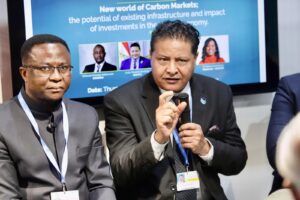The Chief Investment Officer of the Jospong Group of Companies, Noah Gyimah, has emphasized the significance of capacity building in securing carbon financing for developmental projects in Africa.
He stressed that understanding which projects attract carbon financing requires capacity building in both private and public sectors. He cautioned that without this capacity, climate change discussions remain theoretical.
Gyimah, speaking in an interview at the sidelines of the 29th Conference of Parties (COP29), emphasized key areas for capacity building, including project finance, data collection, and technology integration.
For Ghana to be able to really reach that apex of attracting capital, it's very, very important that we build capacity at the resources that we need. People understanding of project finance, people understanding of actual documentation and the data houses we need to build to be able to have data sources to prove this work that we are doing. It's very, very important taking advantage of new technology like AI to be able to simulate your data because all of these are data-driven, he stressed.
He re-echoed that Jospong's success story of securing $20 million from the Swiss Government was made possible through technical expertise and sustainable finance.
Gyimah also underscored the role of technology, such as AI, in simulating data and optimizing waste management.
If you mention that I'm going to remediate 1.5 metric tons of CO2 and then this amount of tons of waste I need to collect, you need to have data point proving that that is possible. And all of this requires us having the right technology to be able to go ahead and then optimize that to receive money," he emphasized.
For effective waste segregation, Gyimah suggested policy initiatives like subsidized bins or buyback programs. Adding that Jospong's innovative approaches include waste segregation, recycling, organic fertilizer production, and transfer loading stations.
Gyimah concluded that collaboration between individuals, governments, and private sectors is necessary to reduce carbon emissions and create a sustainable future.
The European Climate Pact Ambassador in Egypt, H. E. Mostafa Sherbiny, highlighted the potential benefits of the global carbon market for African countries like Ghana and Nigeria.
He noted that the approved global carbon market will enable these countries to develop projects focused on carbon dioxide removal, decarbonization, and emissions reduction which will enable them to sell carbon credits to countries worldwide, financing environmental projects and reducing greenhouse gas emissions.
H.E. Sherbiny emphasized two key benefits of the carbon market as finance for sustainable development projects and mitigation of greenhouse gas emissions.
To leverage this opportunity, African countries must establish compliance markets compatible with the European Union's Carbon Border Adjustment Mechanism (CBAM) and ESPAM directives, he noted.
He added that this will facilitate exports to the EU and reduce certificate costs. Capacity building is crucial for effective implementation, particularly in verifier training and certification, carbon footprint calculation and sustainability reporting.
Sherbiny stressed the importance of transparency, good verification, and validation processes to ensure the success of the carbon market.
With proper implementation, African countries can capitalize on the global carbon market, driving sustainable development and reducing emissions, he stated.
The two speakers participated in a side event at COP 29 on the topic "New World of Carbon Markets: The Potential of Existing Infrastructure and Impact of Investments in the Green Economy" which was facilitated by Dr. Abena Asomaning, the Managing Director of Africa Environmental Sanitation Consult.
The COP29 opened in Baku, Azerbaijan, on Monday, November 11, 2024, with a pressing call for world leaders to agree on an ambitious new global climate finance goal.
The two-week COP29 conference (11-22 November, 2024,) will focus on several key thematic areas, including the World Leaders Climate Action Summit, finance, investment and trade, energy and peace, relief and recovery, and science, technology and innovation.
Source: Kofi Ahovi Baku- Azerbaijan
Courtesy Jospong Group
Comments